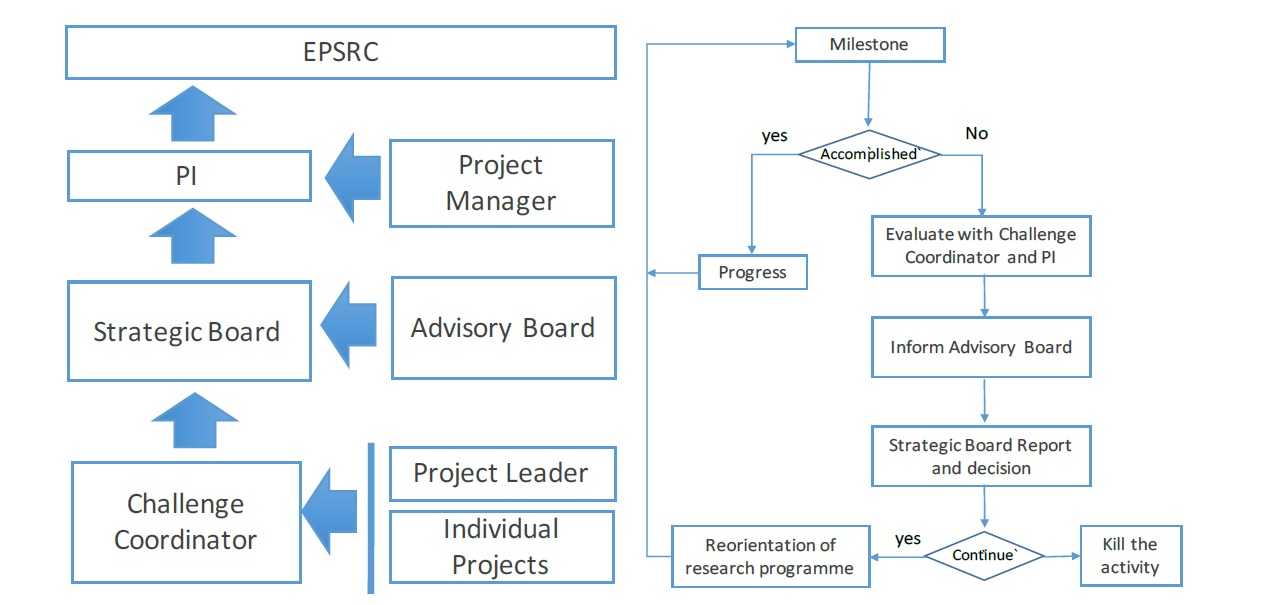
Management Strategy
Prior to the start of the project, all partners will sign a formal collaborative agreement, setting out the general principles of the collaboration based around responsible open innovation, intellectual property, research integrity, a data management plan, publication policy.
It will cover the consortium’s roles, objectives and milestones (including assignment of work package (WP) leaders), risk mitigation; gender equality and equitable partnership. We will also agree a risk register, agreeing on the major risks and a mitigation strategy. Finally, the agreement will emphasise all partners’ obligations and responsibilities as well as the flexible assignment of resources based on the progress of each project. The grant consists of seven flexible projects (WP I-WP VII) within three healthcare grand challenges (GC1, GC2, GC3). Each WP will be led by a named investigator and all WPs are linked to more than one GC. Each GC will have a Challenge co-ordinator who will assess the progress of the WPs according to the vision of the challenge and other GCs to ensure the engineering is tailored to their needs.
Work Package Project leaders
| WP I – Professor Faccio; | WP V – Professor Imran; |
| WP II – Professor Killick; | WP VI – Professor Murray-Smith; and |
| WP III – Professor Muckli; | WP VII – Professor Mair. |
| WP IV – Dr Quinn; | |
See Academic Team for more information on each WP project leader.
Grand Challenge Coordinators
| GC I – Dr Vuckovic |
| Assessing Health through Physiological, Mental and Emotional Wellness, Unobtrusively. |
| With contributions from WP I, II, V, and VI. |
| GC II – Dr Gallacher |
| Identification of Clinically Relevant Changes. |
| With contributions from WP I, II, III, IV, and V. |
| GC III – Professor McIntosh |
| Economic and Social Drivers for Adoption. |
| With contributions from WP I, III, VI, and VII. |
See Academic Team for more information on each GC coordinator.
Defined Management Mechanisms

Figure 1 (left), the reporting structure and (right), the decision-making process around how resource allocation with being managed in a flexible manner if milestones are not achieved
In general, we have five defined management mechanisms, whose inter-connectivity is illustrated in Figure 1 (left) shown above.
1) Project leaders will report monthly to GC co-ordinators who in turn will liaise with the PI face-to-face.
2) The PI will convene the quarterly strategic board (SB) composed of all investigators.
3) An international Advisory Board (AB) will meet each year and will report to the SB. The AB will provide strategic oversight of progress and advise on matters concerning outreach, impact and other potential areas for exploration (i.e. new markers and indicators of health) as these emerge either as a result of our own technical innovation and discoveries, or through advances in the medical community. It is our intention to invite the AB to participate in the first co-creation workshop, to help them to understand the process.
4) The AB and SB (together the management board (MB)) will meet annually to discuss progress and direction. Major changes to the project plan and other decisions will normally be made by consensus although, if necessary, the PI will have the final say in decision making.
5) The PI will be supported in the day-to-day management and decision making by a 80% FTE Project Manager who will not only report to the PI, make sure that the project stays on track, and that objectives and any deadlines established by the SB are met, but will also act as a focus for impact pathways and advocacy (including public engagement). The PI will report to EPSRC and will have overall responsibility for the grant.
Details of External Advice
The AB will comprise leading international experts including Prof Ian Craddock (PI of SPHERE IRC, Bristol), Prof Iain Buchan (Chair in Public Health and Informatics, Liverpool), Ed Clifton (Health Improvement Scotland), Prof. Federica Villa (Quantum Sensor Engineer, Politecnico Milano), Dr Annette Bramley (Director of N8 Research Partnership), a patient group representative and a member of ALLIANCE Scotland. A representative of the AB will be invited to attend the quarterly SB meetings and an EPSRC representative will be invited to attend AB meetings, in both cases to improve connectivity.
Monitoring strategy
WP leaders will work closely with their teams to meet deliverables and milestones. The grant will start with a well-defined work-plan that will be assessed regularly against the milestones defined for each project. Milestones will be used as key decision points for the projects to assess the research activity.
If milestones are not achieved, the WP leader will liaise with the GC coordinator and the PI to modify the research strategy. The AB will be informed and their recommendations will be discussed within the SB to decide on the possible reorientation of the programme. Choices can then be made to allocate further resources or to terminate / rationally bring to an end the activity to favour a more successful area.
Strategy for Flexible use of Resources
The flexible use of resources is one of the key advantages of an ambitious grant. In consultation with our AB, we will take tough decisions to redirect resources towards the most successful lines of research after review of performance, impact potential and international research quality. This may involve redistribution of PDRAs and consumables budget (including an especially created flexible fund) to help strategically re-direct research in Phase II (between months 30-60). This understanding will be reflected in the collaboration agreement, signed by all parties before the grant starts.The flexible use of resources will be managed at three different levels:
Intra-Project Flexibility: WP leaders will be empowered to re-distribute resources to respond to the most successful and promising milestones;
Intra-Challenge Flexibility: When a project fails to meet a milestone, the high-level monitoring strategy will evaluate the questioned research line, and mitigation discussions will decide upon alternatives or to redirect resources toward other activities within that, or, indeed, other projects;
Intra-Programme Flexibility: Linked to the evolution of our research and that of the international community, we have the flexibility to distribute resources to re-focus resource on more advanced or impactful challenges (in consultation with the AB).
Resources for Project Management
We have included specific resources to manage the grant appropriately. Cooper (PI) will devote 30% of his time to the grant including at least 20% in management activities. We will recruit an 80% FTE Project Manager who will be responsible for making sure that the project stays on track and that objectives and any deadlines are met. They will manage the administrative burden of the grant and will be an impact manager, liaising with the impact lead, to facilitate our Pathways to Impact.
We have not included a specific funding request for Creativity@Home as the resources required for our five co-creation workshops already extends beyond the value and scope of this scheme. We plan to have cocreativity and co-production workshops each year This will allow the SB, the AB, patients, industry, healthcare professionals, charities and those involved in making policy to meet with the whole research team (including early career researchers). The objectives will be, for example, developing new mechanisms to pursue the existing objectives of the grant more effectively as well as to think beyond the limits of the described research and explore new avenues of research. New directions that are decided as a consequence will be discussed with the AB, EPSRC and the whole team, seeking to build a motivating team spirit.
Data Management Plan
The majority of data will be generated through collection from new instruments and prototypes that measure complex clinical outputs. It may include images, diagnostic data and associated metadata (e.g. cross-sectional quantitative and qualitative field study data, questionnaire data and geospatial data). We intend to manage data using FAIR Data Principles (findable, accessible, interoperable and reuseable).
A comprehensive Data Management Plan (DMP) will be established at a co-creation/ kick-off meeting. We will develop an online data portal using Tiki CMS groupware, that will contain documentation of the DMP and best practice guides. The use of the University of Glasgow’s ‘Enlighten: Research Data’ repository has been budgeted. For long-term data maintenance, final datasets will be deposited in an institutional repository that is maintained for 10 years and is indexed and discoverable in re3data.org.
Acronyms
WP – Work Package
GC – Grand Challenge
SB – Strategic Board
AB – Adivsory Board
MB – Management Board

